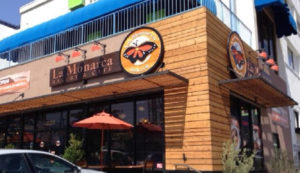The USPTO refused registration of the mark MONARCH ROASTING for “coffee sold in cartridges for use in single serve brewing machines” [ROASTING disclaimed], finding it likely to cause confusion with LA MONARC BAKERY & CAFE for “restaurant and cafe service” [BAKERY & CAFE disclaimed]. Third-party registrations convinced the Board that the goods and services are related (six registrants sell coffee pods and restaurant services, each under a single mark). But what about the marks? How do you thing this came out. In re Trilliant Food and Nutrition, LLC, Serial No. 86947151 (December 13, 2016) [not precedential].

The examining attorney also submitted evidence that coffee pods are offered for sale in restaurants and cafes. Therefore, it all boiled (percolated?) down to the marks.
The involved mark have obvious difference in appearance and sound. As to meaning, the examining attorney contended that the dominant portions of the marks are MONARCH and MONARCA, and that these terms should be considered equivalent under the doctrine of foreign equivalents. The evidence established that MONARCA is Spanish for :monarch,” that “LA” is a Spanish definite article meaning “the,” and that there were 39 million Spanish-speaking residents of the United States.
The Board noted that the doctrine of foreign equivalents should be applied when an American consumer is likely to stop and translate the mark. However, that rule is not absolute, and should be taken as a guideline. The CAFC and the Board have recognized that in some contexts, even those familiar with the foreign language will not stop and translate: e.g., VEUVE CLIQUOT, CORDON BLEU, and TIA MARIA.
The cited mark LA MONARCA BAKERY & CAFE combines Spanish and English words. Clearly, this mark is directed to an English-language audience, and is not “an attempt to translate a mark for the purpose of reaching the English-language market.” Customers are likely to appreciate that fact, and those that speak Spanish are unlikely to believe that LA MONARCA is intended as a translation of an English-language mark.
The Board concluded that customers will take the Spanish wording “as is,” rather than translated it for the purpose of associating it with another mark. Therefore it is not appropriate to apply the doctrine of equivalents. Nonetheless, the Board did take into account that the two words MONARCH and MONARCA have similar meanings.

